Intelligence experts skeptical of ISIS's Garland shooting claim
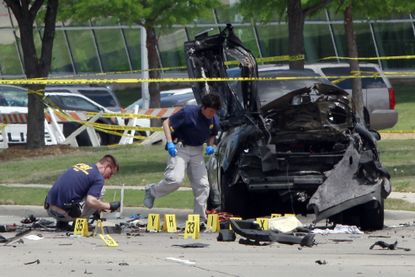

Islamic State appears to have taken credit for the attack on a cartoon-drawing contest in the Dallas suburb of Garland on Sunday, calling gunmen Elton Simpson and Nadir Soofi "soldiers of the caliphate." Simpson had been interacting with ISIS figures on Twitter, the FBI says, but intelligence analysts are skeptical that ISIS ordered the attack. It's likely the attack was less directed by ISIS than "inspired by them," says Rep. Michael McCaul (R-Texas), chairman of the House Homeland Security Committee, citing intelligence officials.
That's not necessarily something to be happy about. "ISIS and its caliphate is becoming a brand, looser even than a network like Al Qaeda," Omer Taspinar, an expert on political Islam at the Brookings Institution, tells The New York Times. "It's a kind of spiritual belonging. Claiming credit does not necessarily indicate any kind of organizational link." That suggests more lone-wolf ambushes like the Garland one and fewer big operations like the Sept. 11, 2001, attacks.
Unlike Al Qaeda, says terrorism scholar J. M. Berger, ISIS "can retroactively ratify attacks that they like and ignore those that don't serve its purpose." In that sense, the Garland attack is an odd one to try and own: Despite firing assault rifles, wearing bulletproof vests, and having the element of surprise, Simpson and Soofi were apparently shot dead by a traffic cop with a pistol, after incurring only one minor injury.
Subscribe to The Week
Escape your echo chamber. Get the facts behind the news, plus analysis from multiple perspectives.

Sign up for The Week's Free Newsletters
From our morning news briefing to a weekly Good News Newsletter, get the best of The Week delivered directly to your inbox.
From our morning news briefing to a weekly Good News Newsletter, get the best of The Week delivered directly to your inbox.
Create an account with the same email registered to your subscription to unlock access.
Sign up for Today's Best Articles in your inbox
A free daily email with the biggest news stories of the day – and the best features from TheWeek.com
Peter has worked as a news and culture writer and editor at The Week since the site's launch in 2008. He covers politics, world affairs, religion and cultural currents. His journalism career began as a copy editor at a financial newswire and has included editorial positions at The New York Times Magazine, Facts on File, and Oregon State University.
-
 Cicada-geddon: the fungus that controls insects like 'zombies'
Cicada-geddon: the fungus that controls insects like 'zombies'Under The Radar Expert says bugs will develop 'hypersexualisation' despite their genitals falling off
By Chas Newkey-Burden, The Week UK Published
-
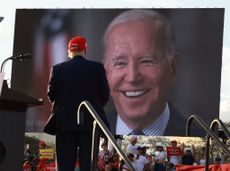 'Voters know Biden and Trump all too well'
'Voters know Biden and Trump all too well'Instant Opinion Opinion, comment and editorials of the day
By Harold Maass, The Week US Published
-
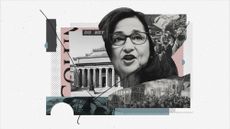 Is the Gaza war tearing US university campuses apart?
Is the Gaza war tearing US university campuses apart?Today's Big Question Protests at Columbia University, other institutions, pit free speech against student safety
By Joel Mathis, The Week US Published
-
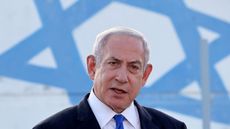 Israel proposes two-month pause in Gaza war in exchange for all Hamas hostages
Israel proposes two-month pause in Gaza war in exchange for all Hamas hostagesSpeed Read Deal doesn't include an agreement to end war, but might be 'the only path that could lead to a ceasefire', said US officials
By Harriet Marsden, The Week UK Published
-
 Nato official warns of all-out war with Russia in next 20 years
Nato official warns of all-out war with Russia in next 20 yearsSpeed Read Civilians must prepare for life-changing conflict and mass mobilisation, says military chief
By Harriet Marsden, The Week UK Published
-
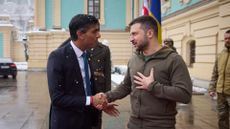 Rishi Sunak visits Kyiv to announce £2.5 billion in military support for Ukraine
Rishi Sunak visits Kyiv to announce £2.5 billion in military support for UkraineSpeed Read Surprise trip comes amid increased Russian bombardment and escalation of Middle East crisis
By Harriet Marsden, The Week UK Published
-
 British warship repels 'largest Houthi attack to date' in the Red Sea
British warship repels 'largest Houthi attack to date' in the Red SeaSpeed read Western allies warn of military response to Iranian-backed Yemeni rebels if attacks on ships continue
By Richard Windsor, The Week UK Published
-
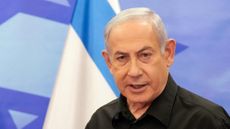 Israel preparing to flood Hamas tunnels with seawater
Israel preparing to flood Hamas tunnels with seawaterSpeed Read IDF pumps could drive out terrorists but critics warn of danger to hostages and Gaza water supply
By Harriet Marsden, The Week UK Published
-
 Houthi rebels claim Red Sea ship attacks
Houthi rebels claim Red Sea ship attacksspeed read Iran-backed Yemeni group vows to escalate aggression towards Israel-linked vessels in revenge for Gaza war
By Harriet Marsden, The Week UK Published
-
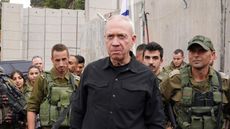 Israel plans next phase of Gaza war as first hostages released
Israel plans next phase of Gaza war as first hostages releasedSpeed read After four-day ceasefire 'we will not stop' until destruction of Hamas, says Israel
By Harriet Marsden, The Week UK Published
-
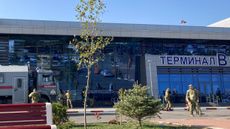 Mob storms Russian airport 'looking for Jews'
Mob storms Russian airport 'looking for Jews'Speed Read Plane from Israel surrounded by rioters chanting antisemitic slogans after landing in Russia's Dagestan region
By The Week UK Published